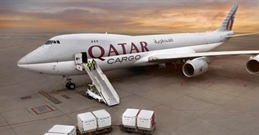
Qatar Airways Group noted the strong performance of its cargo business for the year ended following the release of its 2020-2021 Annual Report ended March 31, 2021.
It said although the airline reported a net loss of QAR14.9 billion (US$4.1 billion), mostly due to a one-time impairment charge related to the grounding of the airline's Airbus A380 and A330 fleets, it said the Group's operating results demonstrated its resilience during the crisis, with the reported operational loss at QAR1.1 billion(US$288.3 million) or 7% less compared to 2019/2020 period.
The Group also ahieved a significant improvement in EBITDA, which stood at QAR6 billion (US$1.6 billion) compared to QAR5 billion (US$1.4 billion) the previous year.
"A combination of our Qatar Airways Cargo division and the Group’s commercial adaptability have been at the core of this recovery," the airline said.
During the pandemic’s peak, Qatar said its cargo arm "more than tripled" its daily services, operating a record 183 flights in one day during the month of May 2020.
Cargo has also overseen a 4.6% rise in freight tonnes handled over the previous fiscal year (2019/20), with 2,727,986 tonnes (chargeable weight) handled in 2020/2021 — or an increase in freight handled, as well as a significant increase in cargo yield, also saw the carrier’s cargo revenues more than double, the carrier added.
Responding on what has been the "most challenging and extraordinary 12 months in the airline’s history," Qatar Airways Group Chief Executive, His Excellency Akbar Al Baker, said: "There are three words that I believe best describe Qatar Airways Group’s response in the past year – strength, resilience, and commitment. Strength to not shy away from taking a risk or avoiding difficult decisions, resilience in remaining focused and not allowing events to overcome us, and commitment by never reneging on our promises to customers, partners, and employees."
"Whilst our competitors grounded their aircraft and closed their routes, we adapted our entire commercial operation to respond to ever-evolving travel restrictions and never stopped flying, operating a network our passengers and customers could rely on. With the support of our varied fleet of modern, fuel-efficient aircraft, we were able to ensure that more of our scheduled flights operated than any other carrier ... whilst maintaining global supply chains to transport medical aid and supplies essential to the fight against COVID-19."
Al Baker noted that Qatar Airways also "significantly expanded" its charter business as a direct response to increased demand.
"Despite enduring one of the most difficult years in the Group’s history, based on strong commercial fundamentals, the airline has rebuilt its network from a low of 33 destinations to more than 140 destinations today," Qatar Airways said in its statement, adding that the airline continued to identify new markets, launching nine new destinations – Abidjan, Côte d’Ivoire; Abuja, Nigeria; Accra, Ghana; Brisbane, Australia; Harare, Zimbabwe; Luanda, Angola; Lusaka, Zambia; San Francisco and Seattle in the US.
The Group noted that it also made significant progress in its ambition to forge new strategic partnerships with several major airlines, including American Airlines, Air Canada, Alaska Airlines and China Southern Airlines.
These new alliances, along with an expanded cooperation with several existing partners, including JetBlue, Iberia, LATAM, Cathay Pacific and Oman Air, further strengthened Qatar Airways’ connectivity, the carrier added.
Moving forward, Qatar is seeking to focus on the long-term investments in a sustainable, fuel-efficient fleet and innovative digital technologies, establishing and strengthening strategic partnerships with leading airlines around the globe, and also launching new routes.



